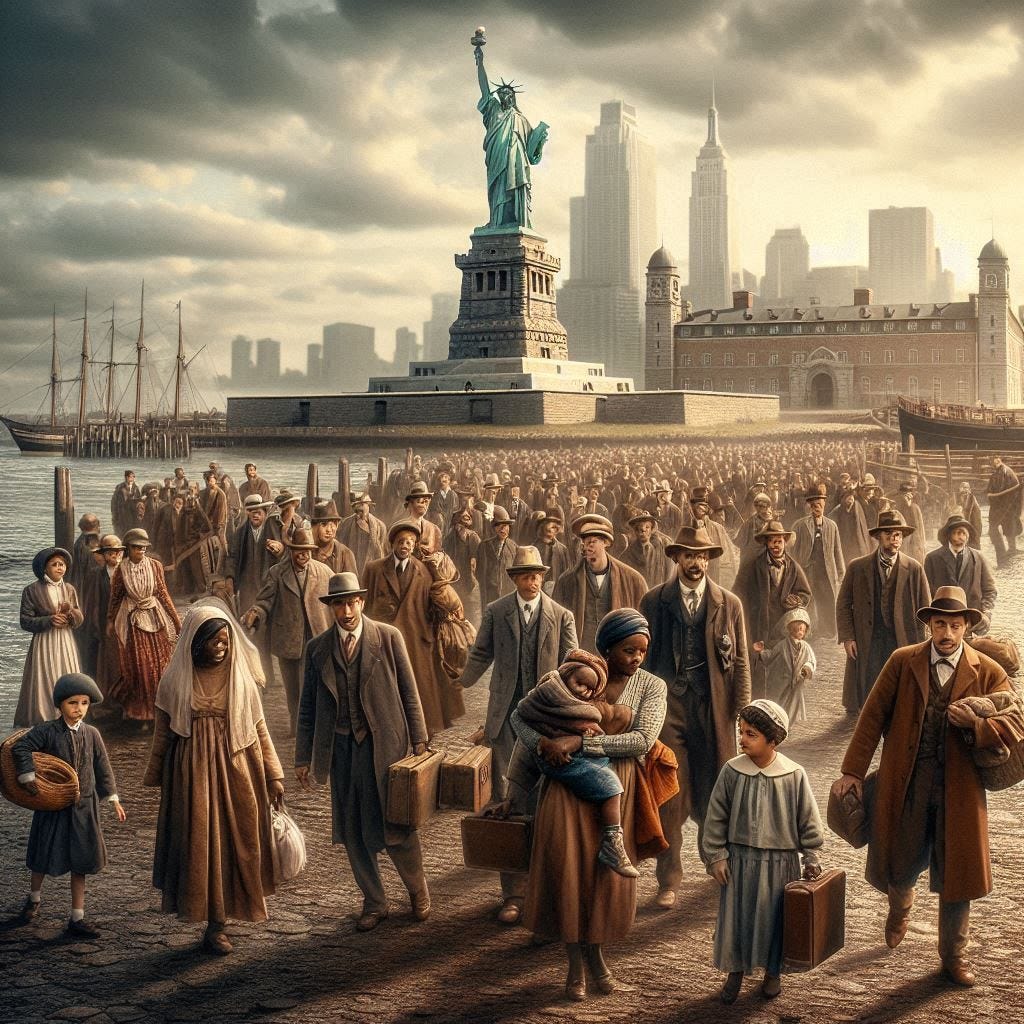The Mysteries of History (February 5)
Punic Wars, Immigration, FDR and the Supreme Court, and Medgar Evers
“Those who cannot remember the past are condemned to repeat it.” — Spanish-American philosopher George Santayana, 1905
146 B.C.E. — Punic Wars End
public domain image from wikimedia commons
After more than a century of waging battle upon battle in what were called The Punic Wars, the Romans defeated Carthage on this date in 146 B.C.E. (Before the Christian Era or Before the Common Era).
Rome thus became the dominant power in the region, a position it kept until the 1700s, when Britain came to the fore.
It was during the second of the three Punic Wars that the Carthaginian military leader Hannibal (not Lecter) led an expeditionary force (which included dozens of elephants) over the Alps, as illustrated in the image below generated using Bing Image Creator.
Questions: Who was Hannibal? When and how did he die? Which modern countries make up what was then known as the Carthaginian Republic? Do any remnants or ruins of the city of Carthage still exist?1917 — U.S. Immigration Restricted
image generated using Bing Image Creator
President Woodrow Wilson had vetoed the legislation, but a two-thirds majority of Congress was able to push through immigration “reform” on this date in 1917, which required those who wanted to move to the U.S. to pass literacy tests. It also barred most Asians from entering the country, something that had also occurred in the 1800s, when Chinese nationals in particular were not warmly welcomed, to put it mildly.
In fact, in 1882, the bluntly-named Chinese Exclusion Act was passed in America, denying entrance to laborers from China for the next decade.
Xenophobia (anti-foreigner feelings) ran high among many Americans in 1917, due to the Great War that was in progress (American had been supporting the war effort, but entered the war directly just a couple of months later).
Questions: Why did the American people and/or its government want to limit the influx of foreigners, especially Asians? Was the Chinese Expulsion Act ever repealed? What tests do would-be immigrants to America now need to pass? What benefits and drawbacks are there from preventing those who want to relocate to America from being able to do so? How many people do you know who were born in a country other than the United States? How many friends do you have who were born in a country other than the United States? 1937 — FDR Attempts to Pack the Supreme Court
public domain image from wikimedia commons
On this day in 1937, at the start of his second of three terms as President, FDR (Franklin Delano Roosevelt) professed his desire to increase the number of Justices on the Supreme Court from nine to fifteen. He claimed a motive of making the Supreme Court more efficient in this way, but critics asserted that his real intent was to “pack the court” with like-minded Justices who would help support him in carrying out his political agenda. Whatever his motive, FDR’s attempt to increase the size of the Court failed: the Senate struck down his plan 70-22, and so the Court remained at nine Justices, as it is still constituted today. Despite this setback, FDR was able to achieve most of his political goals yet.
Questions: Why did the failure of FDR to "pack the court" not result in preventing him from accomplishing his political aims? As to FDR's stated motive versus his suspected motive, did he have a reputation for consistently being honest? How many times did FDR win the Presidential election, yet why did he not serve in that office that many times? Who was FDR's wife, and what did she accomplish in her lifetime? To which other President was FDR related? What is FDR most known for (politically speaking, anyway)?1994 — Delayed Justice for Medgar Evers
public domain images from wikimedia commons
More than 30 years after U.S. Army veteran, family man, and Civil Rights Activist Medgar Wiley Evers was murdered in his driveway in 1963 by a cowardly racist shooting from a hiding place, the perpetrator was finally convicted for his crime.
The murderer was a member of the KKK and fittingly sold animal poop for a living. He had been a suspect all along, but all-white, all-male juries had shirked their duty and refused to find him guilty. Byron De La Beckwith lived to be 80 years old, but spent the last seven years of his life, from 1994 to 2001, in prison.
Questions: Why were the juries all-white and all-male? Why did none of the members of the jury have the heart or guts to do the right thing? How did their lives end up? What had Medgar Evers been able to accomplish in his life? What did his wife Myrlie do in order for justice to finally be served?










